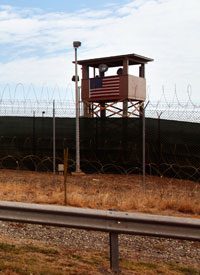
“This is me following through,” Obama stated at the signing (video), “on an understanding that dates back to our founding fathers, that we are willing to observe core standards of conduct not just when it’s easy but also when it’s hard.” The ban on torture limits all government agents to the Army Field Manual’s approved questioning techniques. The president signed the executive orders flanked by more than a dozen retired generals from the U.S. armed forces, who enthusiastically endorsed the executive orders.
The executive orders appear to bring the U.S. government closer to the standard of the Constitution’s Bill of Rights and congressional statutes on due process and torture.
Executive orders from President Bush had established the policy of torture that included waterboarding, denial of medical treatment, and prolonged sensory deprivation, based upon Chinese communist torture methods designed to elicit false confessions.
These techniques flagrantly violated the Eighth Amendment to the U.S. Constitution, laws passed by Congress, and several treaties ratified by the United States.
Executive orders have been issued since by presidents since George Washington. They are legitimately issued when they are orders for the executive branch to carry out the letter of the law as passed by Congress under the U.S. Constitution. Using that standard as a measure, these three executive orders are appropriate. They follow the law as passed by Congress (as well as the Constitution’s Eighth Amendment) and undo past executive orders (issued by President Bush) that usurped the constitutional power of Congress “to make rules for the government of the land and naval forces.”
The mess left by Bush’s unconstitutional executive orders on detention and torture has made prosecution of actual terrorists problematic, and left a large number of innocent detainees clamoring for justice. Innocent former detainees like Muhammad Saad Iqbal are considering suing the U.S. government. “It’s easy for the U.S. government to say, ‘There are no charges found and he’s free,’” the Pakistani says of being picked up on a false rumor while visiting family in Indonesia. “But who will be responsible for seven years of my life?" And it’s hard to argue with his position, after suffering torture and nearly seven years in isolation from family, friends, and freedom.
Meanwhile, the fact that the Bush administration trained Guantanamo Bay interrogators in techniques that were known to gain false confessions means that proving anything in court would be all but impossible. Released Gitmo inmate Moazzam Begg told CNN: “What procedure can you use on people who have been systematically tortured, including waterboarding, including being stripped naked and beaten? What sort of evidence can be admitted into a court of law that has been extracted under that process?" asked Begg. And even if it is admitted into a court, it could easily be demolished as being unreliable.
Obama also signed a fourth executive order requesting a delay in the Ali al-Marri case before the U.S. Supreme Court. Al-Marri is a legal U.S. resident and citizen of Qatar who has been detained without charges since 2002. Obama termed al-Marri a “dangerous individual.”
— Photo: AP Images


